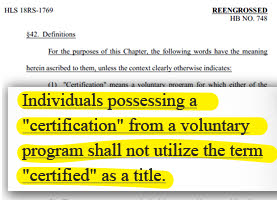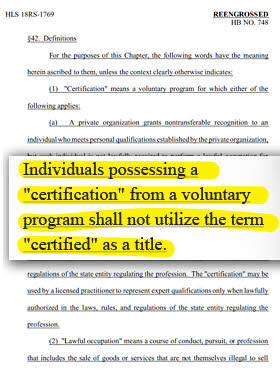

Graphic by Tamara Rees
A version of the proposed Occupational Licensing Review Act approved by the Louisiana House of Representatives last month banned use of the word "certified" except by state regulators. A Senate committee later deleted the prohibition.
For several uneasy weeks, the state of Louisiana appeared on the verge of restricting use of the term “certified” — a word many professionals, including veterinarians, use to signal specialist credentials.
Ironically, the language regulating use of the word appeared in a proposed law intended to lighten regulations on occupations.
How the restriction ended up in the bill titled Occupational Licensing Review Act is something of a mystery. The bill sponsor, Rep. Julie Emerson, a Republican from Carencro (60 miles west of Baton Rouge), said the clause was added in error. The story of its origins and its ultimate demise provides a peek into the messy, often confusing business of lawmaking.
The bill, HB 748, passed the House of Representatives by a vote of 87-7 on April 9 and was anticipated at the time to be approved in the Senate by mid-May.
The bill the House approved stated that “ ‘certification’ may be used by a licensed practitioner to represent expert qualifications only when lawfully authorized in the laws, rules and regulations of the state entity regulating the profession” and that “[i]ndividuals possessing a ‘certification’ from a voluntary program shall not utilize the term ‘certified’ as a title.”
In other words, it looked like veterinarians and other health professionals who had earned specialist credentials would not be able to present themselves as board-certified.
This caught the attention and concern of the American College of Veterinary Internal Medicine, whose president, Dr. Susan White, sent an alert on May 1 to fellow diplomates. “Although the bill was not written with the medical community in mind, its language may well affect all health professions,” White wrote.
The ACVIM sent a letter to the Louisiana Legislature opposing the bill, and White urged diplomates in the state to do likewise.
She added, “All Diplomates should be cognizant of political action within their state in case a similar bill is introduced.”
According to news accounts in Louisiana, the aim of the legislation was to reduce governmental barriers to pursuing occupations. A group called Institute for Justice (IJ) that advocated for the bill identified Louisiana as the “6th most broadly and onerously licensed state" in a report it authored called "License to Work." IJ is a nonprofit public-interest libertarian law firm based in Arlington, Virginia. Its supporters include Charles and David Koch of Koch Industries.
In a news release, IJ stated: “Licensing has spread far beyond the realm of doctors and lawyers in Louisiana. Today, many harmless trades like interior design, braiding hair or arranging flowers can only be entered after securing the government’s permission to work.”
On May 9, the bill went before the Senate Committee on Commerce, Consumer Protection and International Affairs. By then, an array of organizations had voiced opposition to restricting the term “certified,” among them the Institute for Credentialing Excellence, the Financial Planning Coalition (whose constituents include certified financial planners) and the National Board of Certification in Dental Laboratory Technology.
The Senate committee ended up amending the proposal substantially, reducing what had been a six-page bill to half a page. The language limiting use of the word “certified” was eliminated.
Emerson, the bill sponsor, supported removing the clause. Apologizing for the confusion, she told the VIN News Service that the language was not in the bill she introduced, and called its inclusion a mistake.
“It was never my intention to deal with certifications at all in this bill,” she said by email. “The bill was only calling for a review of occupational licenses. The reason certifications was mentioned was to provide a good alternative to licensing. Also, private certifying organizations were only mentioned to protect them, not harm them.”
Emerson continued: “Along the way in the process, an amendment was put on in the House that changed one sentence in the certifications definition to say that certified individuals shall not utilize the term certified. This was so far from my original intent ... in fact the original language said ‘non-certified individuals shall not utilize the term certified.’ (Obviously the complete opposite). This was an unfortunate error that I always planned to correct in the Senate committee.”
Owing to the confusion and the “damage” caused by the incorrect wording, Emerson said, “we decided to remove all language about certifications all together, which seemed to satisfy everyone concerned about certifications.”
In sum, she said, “[T]his doesn’t deal with certifications at all and should have no effect on veterinarian certifications.”
The substantially revised bill directs the governor’s office to review all occupational licensing requirements during the next five years to determine whether they are appropriate. The bill was approved by the Senate this morning, 25-4.